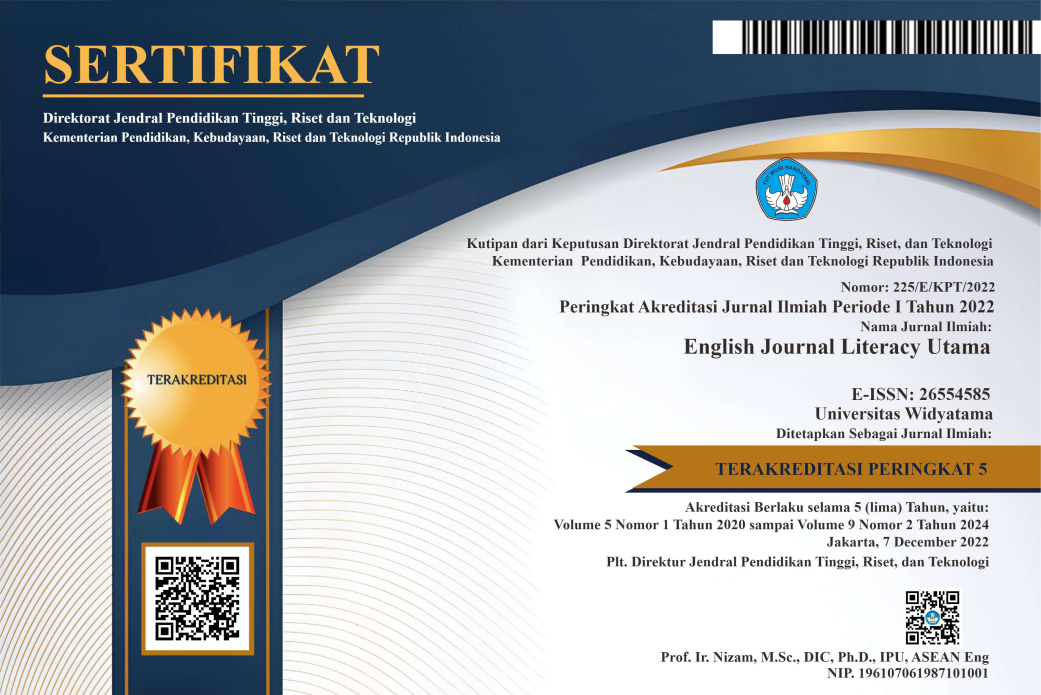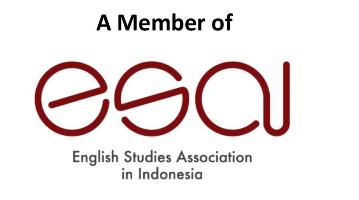ENGLISHIZATION AND THE DISCURSIVE CONSTRUCTIONS IN SOCIAL MEDIA DISCOURSES OF THE #ENDSARS PROTEST IN NIGERIA
DOI:
https://doi.org/10.33197/ejlutama.v7i1.185Keywords:
Discursive Constructions, Englishisation, Social Media Discourses, #EndSARS ProtestAbstract
The social media has become a potent digital tool to make strong political and social statements globally especially with the internationalization of English. This has been underscored by the #EndSARS protest in Nigeria. The protest, led mainly by Nigerian youths, remains one of the most sweeping social media activisms in the history of the country. The reverberations and revolts which accompanied the initially peaceful protest have brought to the fore the power of the social media. This study identifies the discursive strategies and semiotic resources deployed during the #EndSARS protest to underscore the role of English in the construction and counter construction of discourses. Using Critical Discourse Studies and Multimodal Discourse Analysis, the paper interrogates about 30 purposefully sampled posts from selected WhatsApp platforms during the protests. The study argues that the social media affords users a platform to communicate without the gatekeeper constraints of mainstream media to create group membership, spread ideologies, and to draw national and global attention using the medium of English to cut across geo-political and linguistic boundaries. The study also reveals that while the initial #EndSARS protest constructs an organized, peaceful, and regenerative group of young Nigerians in search of a better Nigeria, a Nigeria of progressive and savvy minds, the counter discourse celebrates disruption, destruction, and death yielding the negative construction of hoodlums, arsonists, looters, and criminals which the #EndSARS protest was supposed to interrogate and repudiate thus temporarily entrenching the status quo and the mentality of business-as-usual in Nigeria.
References
Cavanagh, C. (2017). The role of English in internationalization and global citizenship identity in South Korean higher education. Ph.D Thesis University of Southampton, Faculty of Humanities.
Chun, C. W. (2020). Methodological issues in critical discourse studies. In McKinley, J. & Rose, H. (eds.). The Routledge handbook of research methods in applied linguistics. London, New York: Routledge, pp.199-210.
Egbe, G. B. (2014). Language preference among Nigerian undergraduates and the future of English. International Journal of English Language & Translation Studies, 2 (4), 52-65.
Fairclough, N. (1985). Critical discourse analysis. London: Longman.
Hanska, M. & Bauchowitz, S. (2017). Tweeting for Brexit: How social media influenced the referendum. In: Mair, John, Clark, Tor, Fowler, Neil, Snoddy, Raymond & Tait (eds.) Brexit, Trump and the Media. Abramis academic publishing, Bury St Edmunds, UK, pp.31-35.
Jewit, C. (2014). An introduction to multimodality. In C. Jewit (Ed.) The Routledge handbook of multimodality analysis (2nd ed., pp.14-27). New York: Routledge.
Kress, G. & vam Leeuwen, T. (2001). Multimodal discourse: The modes and media of comtemporary communication. London: Arnold.
Kreis, R. (2020). The role of language in social media during the European migrant crisis. In McIntosh, K. (ed.) Applied linguistics and language teaching in the neo-nationalist era. Switzerland: Palgrave Macmillian, pp. 163-188.
Miyahara, M. (2020). Sampling: Problematizing the issue. The Routledge handbook of research methods in applied linguistics. London, New York: Routledge, pp.52-62.
Okpeh, P. (2017). Critical discourse analysis: An overview. In Ibileye, G. (ed.) Discourse analysis and pragmatics: Issues in theory and practice. Lagos: Malthouse Press Limited, pp.201-214.
Reisigl, M. & Wodak, R. (2009). The discourse-historical approach. In Wodak, R. and Meyer, M. (eds.) Methods of critical discourse analysis. London: Sage, pp.87-121.
Sajir, Z. & Aouragh, M. (2019). Solidarity, social media and the “Refugee Crisis”: Engagement beyond affect. International Journal of Communication, 3, 550-577.
Nairametrics #EndSARS: A day by day timeline of the protest that has brought Nigeria to its knees https://nairametrics.com/2020/10/25/endsars-protest-a-timeline-of-all-the-major-events-from-october-3rd/)
van Dijk, T.A. (1991). News as discourse. New Jersey: Erbanum.
van Dijk, T.A. (1993). Elite discourse and racism. London: Sage
van Leeuwen, T. (2008). Discourse and practice: New tools for critical discourse analysis. New York: Oxford University Press.
Warschauer, M., Jacob, S. & Maamuujav, U. (2021). Online Englishes. In A. Kirkpatrick (ed.). Routledge Hanbook of World Englishes. Second edition. Pp. 479-493. New York: Routledge.
Wodak, R. (1996). The genesis of racist discourse in Austria since 1989. In Caldas-Coulthard, R. and Coulthard, M. (eds.). Texts and practices: Readings in critical discourse analysis. London: Routledge, pp.129-149.
Wodak, R. & Meyer, M. (2009). Critical discourse analysis: History, agenda, theory and methodology. In Wodak, R. and Meyer, M. (eds.) Methods of critical discourse analysis. London: Sage, pp.1-33.
Downloads
Published
Issue
Section
License
Copyright (c) 2022 Gabriel B. Egbe

This work is licensed under a Creative Commons Attribution-NonCommercial-ShareAlike 4.0 International License.
Creative Commons Attribution-ShareAlike 4.0 International License















